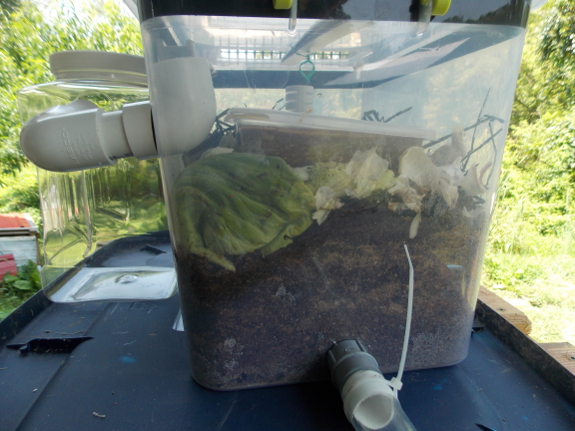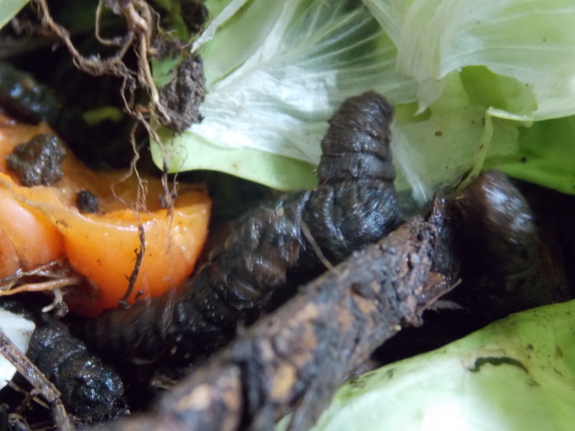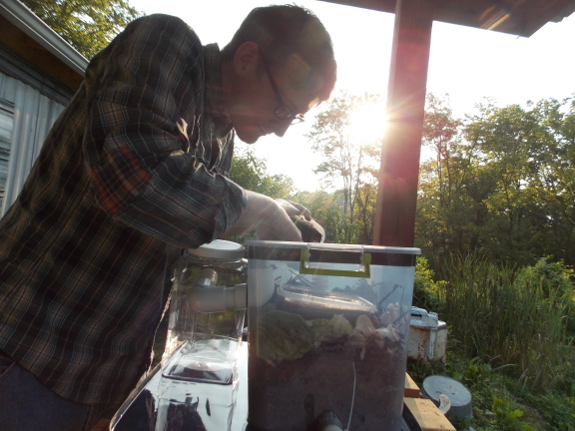
Setting up a black soldier fly bin

We had several commenters
ask questions about our new black soldier fly bin, so I'm going to see
if I can answer them all in one fell swoop. I understand the
interest --- we've been intrigued by black soldier flies for years. The reason we didn't experiment sooner is because we just didn't have time to reinvent the wheel and the only premade bin available when I started researching cost nearly $200. Luckily, while we were dragging our heels, the
folks over at blacksoldierflyblog.com were experimenting to create a
lower-cost version that ships to your door for a total of $76.
Their website also walks you through all of their experiments so that
you could make your own bin easily at home, but we decided to support
their ingenuity and purchase a premade bin.

If you follow our lead, I
recommend you start some food fermenting to attract black soldier flies
as soon as you place your order. It can take a few weeks for
rotten materials (with fermented grain being the blog author's
recommendation) to become ripe enough to attract the mother flies, so
you might as well start early. Since we didn't think ahead in that
way, I started some chick feed fermenting as soon as we got our bin,
but I also went hunting around the yard for black soldier fly larvae to
seed our new bug station. I quickly found a dozen relatively
mature larvae in the bedding beneath what was the duck brooder, where
spilled feed spoiled and attracted the parent flies. Other good
places to look for larvae and eggs include under the lids of trash cans
(for eggs) and in your compost bin (for larvae).

I filled the bin halfway
with partially rotted sawdust (and a bit of homemade charcoal at the
bottom) for bedding, then added a bit of the bedding material that my
found larvae were living in on top. The fermenting chick feed went
in a container on top of the bedding so the feed will stay wet, and I
also added a few vegetable scraps to start prerotting, since black
soldier fly larvae (like compost worms) need food partially broken down
before they can eat it. And then my favorite cousin-in-law also
came bearing gifts --- coffee grounds, which one of our commenters
reports makes a great food for black soldier fly larvae. Hopefully
this combination of materials will get our bin up and running in short
order. Stay tuned for many more updates in the near future.
If
any other cousins-in-law are wondering how to make it into the favorite
category, it's pretty simple. Brave our moat and come visit!
Bearing biomass, of course....
Want more in-depth information? Browse through our books.
Or explore more posts by date or by subject.
About us: Anna Hess and Mark Hamilton spent over a decade living self-sufficiently in the mountains of Virginia before moving north to start over from scratch in the foothills of Ohio. They've experimented with permaculture, no-till gardening, trailersteading, home-based microbusinesses and much more, writing about their adventures in both blogs and books.
Want to be notified when new comments are posted on this page? Click on the RSS button after you add a comment to subscribe to the comment feed, or simply check the box beside "email replies to me" while writing your comment.

Question. How much chicken feed will this produce? How many grubs are you expecting per week? I do not even know enough about this to ask the proper question but I hope you get the drift. Will it be enough to be a substantial caloric addition or is this just for a treat? Will this replace any supplements you may currently use?
Thanks.